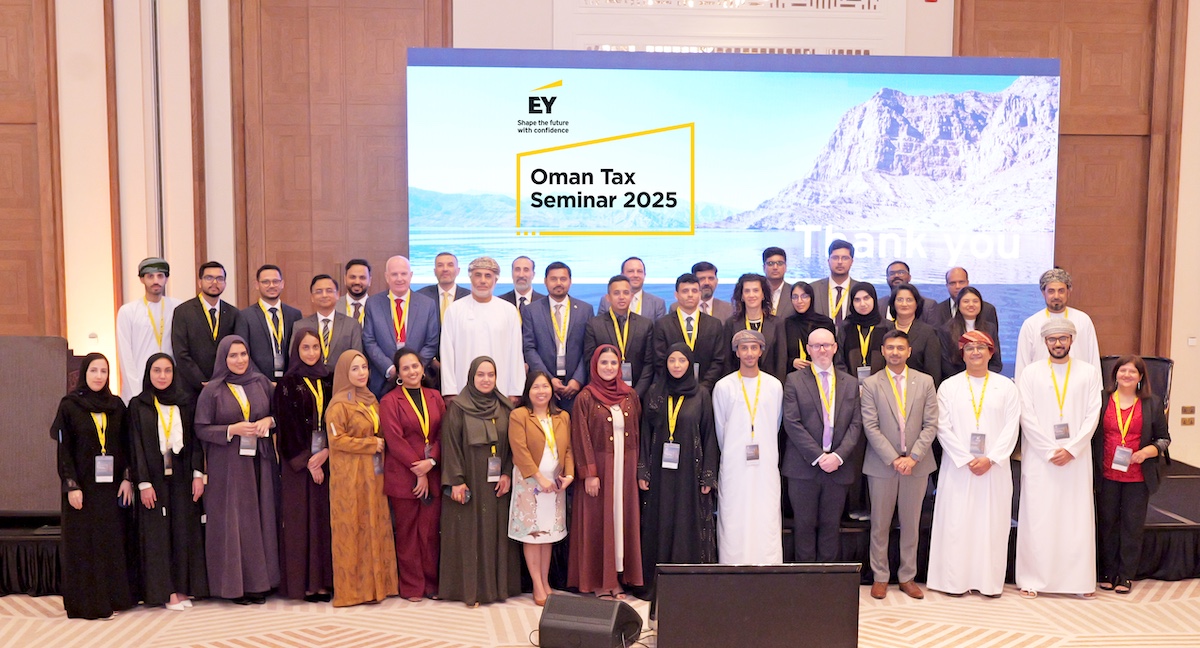Economy
EY Seminar Helps Oman’s Businesses Future-Proof Their Tax Functions

EY has hosted its Oman Annual Corporate Tax Seminar 2025 in Muscat with the aim of guiding businesses in navigating the evolving tax landscape in the country and the MENA region. The latest edition of the event provided an overview of the major developments in the tax system that have taken place in Oman and the wider region over the last 12 months.
The half-day seminar saw the participation of around 240 C-suite executives and finance professionals from Oman-based companies. The event leveraged the knowledge and practical experience of EY’s senior tax professionals to offer comprehensive insights that will help the participants achieve an optimal tax position and adapt their strategy in response to market trends. Speakers also included tax experts from the Oman Government, few of the largest taxpayers in the country, and other partners.
The agenda covered all aspects of the taxes that are currently imposed in Oman from the compliance and investment perspectives. Taxpayers shared their experience with e-invoicing and indirect taxes, such as value-added tax (VAT).
Another session focused on Base Erosion and Profit Shifting (BEPS) Pillar 2, providing a detailed overview of Royal Decree No. 70 of 2024, which went live on January 1, with executive regulations in the works. Applicable to multinational enterprises with a minimum annual turnover of €750 million, the law outlines the implementation of domestic minimum top-up tax (DMTT) and the income inclusion rule (IIR). Most affected companies are currently conducting impact assessments to put adequate provisions in place and can leverage takeaways from the seminar to facilitate the process.
The participants also discussed what tax functions can expect from the policy perspective and explored the impact of AI and automation on their work. In addition, the event examined regulatory updates and recent tax trends across the MENA region with a focus on the GCC, which affect Omani businesses operating in other jurisdictions. These included the full implementation of corporate income tax (CIT) in the United Arab Emirates (UAE), as well as e-invoicing, which has been introduced in five out of the region’s six countries.
The seminar provided participants with an ideal platform for networking and the exchange of experience and best practices in the field of taxation.
Ahmed Al-Esry, EY MENA Tax Leader, says: With the global tax environment evolving at an unprecedented pace, having a tax function is more important for multinationals and other large companies than ever before. Training and upskilling the finance team in tax compliance and other regulatory related matters in line with changing rules and regulations is also crucial. Engaging outsourced service providers, such as EY, can make a significant contribution to monitoring tax exposures, identifying internal risks and achieving an optimal tax position.”
Oman is home to a dynamic tax landscape that is aligning itself with global tax regulations. In 1991, it became the first GCC country to impose CIT on local companies. In 1994, Oman introduced withholding tax on foreign payments, which was expanded in 2017. This was followed by the implementation of excise tax on tobacco, alcohol, energy drinks and sugar-sweetened beverages (SSBs) in 2018 and VAT in 2021.
Alkesh Joshi, EY Oman Tax Leader and EY MENA Sustainability Tax Leader, says: “Companies currently have a wide variety of advanced technology tools at their disposal to automate their tax processes. These tools can go a long way in helping large multinationals in Oman prepare for the rollout of new regulations in line with Royal Decree No. 70 of 2024 and put relevant system changes in place. Meanwhile, access to quality data is becoming increasingly important to facilitate various types of tax compliance.”
-

 Banking & Finance2 months ago
Banking & Finance2 months agoOman Oil Marketing Company Concludes Its Annual Health, Safety, Environment, and Quality Week, Reaffirming People and Safety as a Top Priority
-

 News2 months ago
News2 months agoJamal Ahmed Al Harthy Honoured as ‘Pioneer in Youth Empowerment through Education and Sport’ at CSR Summit & Awards 2025
-

 OER Magazines2 months ago
OER Magazines2 months agoOER, December 2025
-

 News2 months ago
News2 months agoAI Security Conference 2025 Hosted by Securado Highlights the Changing Cybersecurity Landscape
-

 Insurance1 month ago
Insurance1 month agoSupporting Community Wellness: Liva Insurance Sponsors Muscat Marathon 2026 with Free Health Checkups
-

 Interviews1 month ago
Interviews1 month agoEXCLUSIVE INTERVIEW: TLS Rebranding Marks Strategic Leap Toward Innovation, Sustainability & Growth
-

 Insurance4 weeks ago
Insurance4 weeks agoLiva Insurance Supports Community Wellness Through “Experience Oman – Muscat Marathon 2026”
-

 Banking & Finance4 weeks ago
Banking & Finance4 weeks agoA New Platform for SME Growth: Oman Arab Bank Unveils Tumouhi






























